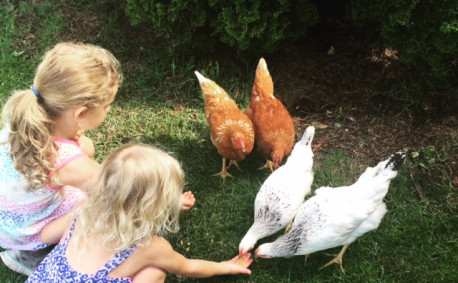How to Talk to Your Kids About Food
Being a parent might just be the most rewarding, beautiful, inspirational job out there. But we won’t sugarcoat the truth: It can also be one of the most challenging. Having an honest conversation with your kids about tricky subjects is scary! And while we can’t help with the birds and the bees, we can shed some light on how to talk with children about food — and why it’s so important.
To get the lowdown from an expert, we spoke with Sarah Hoing, a registered dietitian. Sarah works with clients of all ages at the Special Supplemental Nutrition Program for Women, Infants and Children (WIC) in Topeka.
Why Talk About Food with Kids?
We started by discussing why kids need to know about food and nutrition in the first place.
“Food is such an important part of our lives,” Sarah said. “Not only do many of our gatherings, traditions and holidays revolve around it, but we need it to fuel our bodies! And unfortunately, it’s very easy for a negative association to develop with food, so we need to make sure our kids have a positive — or at least neutral — relationship with it from a young age.”
Nutrition is also key for development.
“If kids aren’t eating enough of a certain thing, it can hinder their growth,” she said. “For example, dairy can help build strong bones since it’s rich in calcium. When kids know how foods work for them, it can encourage smarter decisions.”
With the basics covered, Sarah broke down how to talk about nutrition based on age. The maturity level of your kids will determine the kinds of topics they’re ready for.
Talking About Food in the Early Years
According to Sarah, intentional conversation around food should start as soon as kids begin understanding speech. Their attitudes develop early on, and at this stage, it’s more about what you don’t say than what you do.
“Try not to describe dishes as ‘good’ or ‘bad’ around your kids,” she said. “Labeling foods with adjectives can lead children to develop negative connections with certain things.”
When you can, it’s also great to let your kids get messy! Sarah stresses the importance of young ones exploring and playing with their food. She said this experience with texture allows them to learn more about what they’re eating and determine what they like. Plus, this can decrease their likelihood of becoming picky eaters.
Shifting the Focus with Older Kids
Once kids start to get a little older, Sarah said, they’re ready to learn more about what different foods do for us nutritionally.
“At a certain age, you can start introducing the concept of ‘food groups’ and what each category boosts in our bodies,” she said. “As for desserts and sugars, I love calling those treats ‘fun foods.’ We don’t need them to grow or survive, but they can bring joy, so try not to frame them as completely bad.”
Here are some examples of foods and their purpose:
- Dairy is filled with calcium which helps build strong bones.
- Meats are packed with protein, which serves as an energy source.
- Grains and veggies are high in fiber, which keeps your stomach feeling full.
Once kids go to school and start choosing lunches for themselves, it’s even more important that they’re knowledgeable about what they put in their bodies.
“Make sure your kids are armed with information,” she said. “If they complain about being tired during class or dragging during practice, consider asking what they chose for lunch and what effect the choice had on their brain and body. Try to stress the importance of eating from all food groups and go back to what each one can do for them.”
Keep Communication Open
Eating outside the home can pose additional hurdles like peer pressure and misleading information from community members.
“Your kids will hear the good, bad and ugly about food from sources like friends, teachers and other adults,” Sarah said. “It’s best if they’ve already established a healthy mindset, so if they hear hogwash, they can easily brush past it.”
An ongoing conversation also opens the door for future discussions. If someone calls a certain dish “bad” or claims it will “make you fat,” your child will feel comfortable talking to you about it to get correct information.
Sarah noted the dangers of eating disorders and how young kids can be when they begin. The most recent data from Johns Hopkins Medicine reports the average age for an eating disorder to start is between 12 and 25. Positive discussion around food and avoiding negative talk can help avoid this issue.
The best thing we can do for our kids is to give them all the information possible and make sure they know we’re always there for them.
“You’re laying the foundation for so many things in your child’s life! It can be daunting, but it’s also exciting,” said Sarah, “As with most hard topics, the important thing is to simply have the conversation.”





